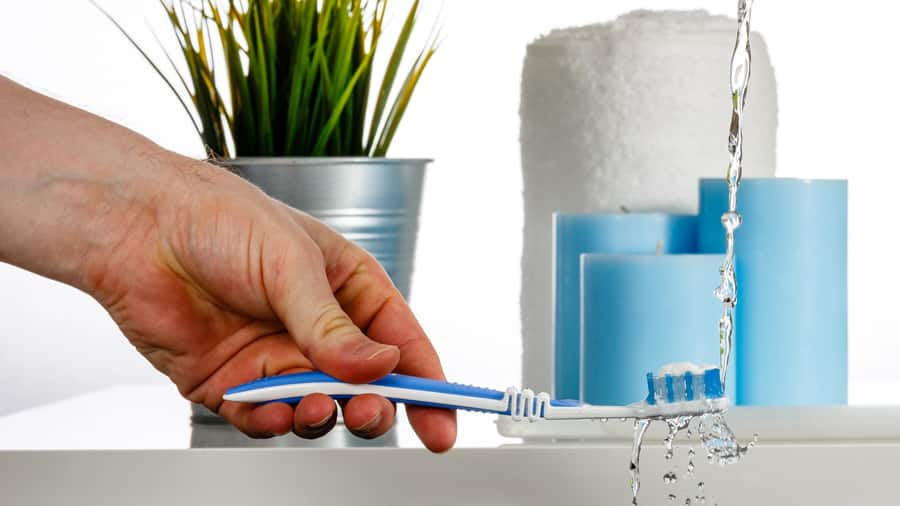Continue reading to learn more about the specific ingredients to look for in the best toothpaste for bad breath. You may also get some insights on the top toothpaste recommendations to help you make an informed choice for your dental care routine.
Understanding Bad Breath
Halitosis, commonly known as bad breath, is an unpleasant mouth odour. While there are various reasons for bad breath, the most common cause of breath odour is related to poor oral hygiene. The oral bacteria in the mouth produce sulphur compounds as waste, which primarily cause bad breath odour. Other causes of bad breath include:
Gum disease: Gingivitis and periodontal disease are considered to be major causes of halitosis due to the pockets that form between the gums and teeth, which trap food particles and bacteria.
Tonsil stones: Tonsils can cause bad breath by trapping food debris, dead cells, and mucus, which hardens into tonsil stones that accommodate bacteria and release unpleasant odours.
Tobacco products: Smoking and using tobacco products cause bad breath by drying out the mouth and leaving a lingering, unpleasant odour.
Oral hygiene: Practising good dental hygiene with regular brushing, flossing, and professional cleanings removes food particles and plaque that contribute to bad breath.
Dry mouth: Insufficient saliva in the mouth makes it difficult to wash away food particles and neutralise acids, leading to bad breath.
Mouth infections: Infections in the mouth, such as oral thrush (a fungal infection), abscesses, or other types of mouth sores, can result in a distinctively unpleasant breath odour.
Medicines: Certain medications, such as those used to treat high blood pressure, anxiety, or depression, can cause dry mouth as a side effect, resulting in bad breath.
Key Ingredients to Look For in Toothpaste For Bad Breath
When it comes to selecting the best toothpaste for bad breath, understanding its key ingredients is essential. Here are the ingredients you should look for:
Antibacterial Agents
If you are wondering which toothpaste is best for bad breath, opt for those with effective antibacterial agents. These agents help remove the bacteria that cause bad breath, giving you a cleaner mouth and fresher breath. By reducing bacterial growth, they also improve overall oral health, reducing plaque buildup and lowering the risk of gum disease. Toothpaste with effective antibacterial properties not only fights bad breath but also promotes a healthier mouth.
Fluoride
Fluoride is considered to be one of the most effective ingredients in toothpaste to fight tooth decay. Almost all toothpaste contains fluoride in one form or another. Fluoride also strengthens tooth enamel and fights cavities, which can indirectly contribute to bad breath. It also reduces plaque buildup on teeth and prevents tartar from forming. While fluoride does not directly freshen breath, it promotes better oral health, reducing factors that can lead to bad breath.
Zinc Compounds
Zinc is commonly added in toothpaste and mouthwashes in the form of zinc chloride or zinc citrate. Some products, like Colgate Total Advanced Health toothpaste, contain both zinc citrate and zinc oxide. These zinc compounds offer mild antibacterial properties that can contribute to fresher breath and may also help reduce plaque buildup. Research suggests that zinc, particularly when combined with surfactants, may help prevent plaque and calculus formation.
Top Colgate Toothpastes For Bad Breath
Choosing the right toothpaste is an important step in tackling bad breath. But with so many options, choosing the right one for your oral care needs can be difficult. To help you out, here are two of the best toothpastes that can really make a difference in keeping your breath fresh.
Colgate Total Advanced Health Toothpaste
Colgate Total Advanced Health toothpaste is an all-inclusive solution for those looking to maintain optimal oral hygiene and fresh breath. This toothpaste provides antibacterial protection for your whole mouth. It fights bacteria not just on teeth but also on the tongue, cheeks, and gums, ensuring 12-hour protection against bad breath. Additionally, its Dual Zinc + Arginine technology forms a protective, anti-germ barrier unlike any other ordinary toothpaste. Its ability to combat multiple oral health issues makes it an excellent choice for maintaining long-lasting freshness.
Colgate Total Charcoal Deep Clean Toothpaste
Colgate Total Charcoal Deep Clean toothpaste offers an effective alternative for those who prefer a more natural approach. This toothpaste features activated charcoal, known for its excellent deep-cleaning properties. The charcoal particles help remove surface stains and whiten teeth, providing a deep clean for a refreshing brushing experience and teeth whitening benefits. It is also well-known to prevent cavities, plaque removal, tartar formation, gingivitis, and sensitivity. The deep-cleaning action of charcoal, combined with the proven benefits of Dual Zinc Arginine technology, ensures a fresh and clean mouth feel.
Achieving fresh breath and a healthy mouth is easy with the best toothpaste for bad breath. Practising good oral hygiene, such as brushing twice daily with fluoride toothpaste, can help you keep bad breath at bay and protect your teeth from cavities. You may also opt for alcohol-free options and consider using a tongue scraper for even fresher breath. By adding these products and practices to your daily routine, you can enjoy the confidence of fresh breath and a bright, healthy smile.
Frequently Asked Questions
- Can toothpaste alone cure bad breath?
Poor oral hygiene often contributes to bad breath. When brushing and flossing are neglected, food particles trapped between teeth break down, releasing an unpleasant odour resembling sulphur or rotten eggs. While regular use of toothpaste or mouthwash can help control bad breath if it is related to poor oral hygiene, they cannot cure bad breath if the underlying issue is different. - How often should I brush to prevent bad breath?
Brush your teeth twice daily to remove plaque and food debris, which are common causes of bad breath. Brush in the morning and always before going to bed. If you are doubtful about which toothpaste is best for bad breath, you may try using Colgate Total Advanced Health toothpaste, which helps reduce bad breath. - How to prevent bad breath?
To prevent bad breath, maintain good oral hygiene by brushing your teeth twice daily with an antibacterial toothpaste and a soft-bristled toothbrush. Also, remember to floss daily. Additionally, stay hydrated, limit sugary and acidic foods, and schedule regular dental check-ups. - Can a bad breath be cured?
Yes, bad breath can often be effectively managed and reduced through proper oral hygiene practices, such as regular brushing with the best toothpaste for bad breath, flossing, dental check-ups, and lifestyle adjustments like staying hydrated and avoiding certain foods. However, it is essential to consult with a healthcare professional to determine the cause of bad breath and get a personalised treatment plan.
ORAL HEALTH QUIZ
What's behind your smile?
Take our Oral Health assessment to get the most from your oral care routine
ORAL HEALTH QUIZ
What's behind your smile?
Take our Oral Health assessment to get the most from your oral care routine













